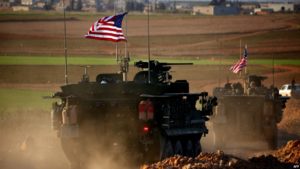Special to WorldTribune.com
Radio Free Europe / Radio Liberty
About 400 additional U.S. forces have been temporarily deployed to Syria with heavy artillery in preparation for a fight to oust the extremist group Islamic State (IS) from its self-declared headquarters in the northern city of Raqqa.

U.S. Air Force Colonel John Dorrian, a spokesman for the U.S.-led coalition fighting IS in Syria and Iraq, said on March 9 that the troops would not have a frontline role in the battle and are in addition to the 500 U.S. soldiers already in Syria.
Related: Significant shifts seen in U.S. strategy against Mideast terrorism
Dorrian said the extra forces would work with local partners in Syria — the Syrian Democratic Forces (SDF), which includes the Kurdish YPG militia, and the Syrian Arab Coalition.
The additional forces arrived in “the last few days” and consist of a Marines artillery unit and Army Rangers, Dorrian told Reuters, confirming U.S. media reports of the deployment.
The SDF, the main U.S. partner in the war against IS in Syria, has been working since November with the U.S.-led coalition to encircle Raqqa.
It said this week that the last remaining major artery running between Raqqa and the IS stronghold of Deir al-Zor Province had been cut off.
The drive to isolate Raqqa is “going very, very well” and could be finished in a matter of weeks, Dorrian added.
Previously, several hundred U.S. Special Operations troops have advised local forces in Syria, but the Pentagon has mostly shied away from using conventional forces there.
Reuters also reported that the administration was considering deploying up to 1,000 U.S. soldiers in Kuwait to serve as a reserve force in a bid to accelerate the battle against IS in Syria and Iraq.
The developments are an early indication that President Donald Trump’s White House is giving the Pentagon greater flexibility in the fight against ISIS.
Military commanders have criticized what they saw as micromanagement by the White House during former President Barack Obama’s administration and argued for greater freedom to make day-to-day decisions on how best to fight enemies.
